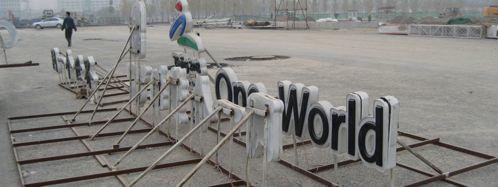
Image by Gladys Pak Lei Chong
The 2008 Olympic Games in Beijing presented a unique opportunity to analyze how an upcoming global power promoted itself to its citizens and to the world, and the voices of support and discontent this promotion provoked. This study analyzes how Chinese authorities (re-)construct a rooted yet new Beijing that signifies a China ready for the 21st century. Given the communication potentials offered by old and, particularly, new media technologies, these imaginations are never fully under the control of the Chinese state but instead also instigate possibilities of protest.
This study, funded by a NWO VIDI grant (2007-2012) consists of three interlocking subprojects. The first project, a PhD project of Gladys Pak Lei Chong, is on promotion. It analyzes how China as an upcoming global power promotes itself nationally to its citizens and globally to the world. The second project, a PhD project of Zeng Guohua, scrutinizes the pivotal and potentially critical role of local, regional and global media – television and the Internet – in the Chinese Communist Party’s attempt to present a new China. The final project investigates voices of compliance and discontent by zooming in on how bloggers and visual artists in Beijing, Hong Kong and Taipei – two key actors in challenging official discourse in China – appropriate the Games.
The research design includes production, text and audience, while a multi-method approach combines a critical discourse analysis with ethnographic field research. This project takes issue with the balancing act of the Chinese state between nation-building projects and cosmopolitan demands. It shows how journalists, bloggers and artists respond to, that is: comply, appropriate, challenge and undermine, the state’s attempt to create a unified imagined community. This project aims to understand the cultural impact the Beijing Games will trigger, which concerns not only the Chinese people but, given the increasing global importance of China, also the world at large.